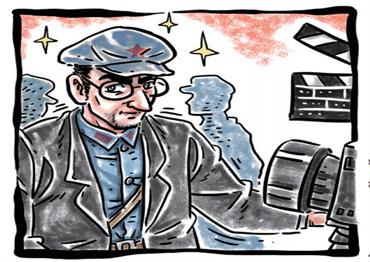The stage is the Great Hall of the People in Beijing, and among the four giant faces on the billboard-sized poster serving as the backdrop, it’s apparent that one of the actors is not Chinese. Look closer and you’ll see him there again standing center stage next to a look-a-like of Mao Zedong in a line that includes a dozen principal actors as well as the film’s two directors. Yes, it’s me, and what’s more, it wasn’t the first time I appeared at this kind of red-carpet premiere at this particular location. Nevertheless, it was a surreal experience both times. It’s been a few years since I have seen those good friends. You bond with people quickly while recreating the challenges and hardships of the Long March (1934-35). And to this day, every time I go past that grand building, I feel a deep and humbling appreciation for the unique opportunities I have had as a resident of the capital.
In the US there’s an old saying: “It’s not what you know, it’s who you know.” And here in China, everyone talks about guanxi (relationships). And although these aphorisms are true wherever you go, there’s another side of that relationship that doesn’t get talked about as often. If someone knows the right person and has the inclination to introduce you, you better have some skills in that area, so you don’t embarrass the person who made the introduction. Fortunately, my Chinese wife was confident I wouldn’t embarrass her. Even so, I have to admit, when she first drove me to a hotel to meet director Zhou Qi and audition for the part of Li De, otherwise known as German communist Otto Braun, she had more faith in me than I did. And in a funny twist, the actual invitation to audition was from my wife’s ex-husband, who is a wellknown actor in the genre of so-called red films. I have to credit him for getting me involved in the mainstream movie business here in China.
After making three films, two TV serials, and a couple of documentaries, I learned quite a lot of Chinese history – things I didn’t get from any English-language books on the subject. All the characters I played had two aspects in common: they were 1) actual people from history who were 2) always in support of China.
The younger generations I’ve met here seldom watch these movies about the War of Resistance Against Japanese Aggression (1931-45), or the civil war spy stories between the Kuomintang (Nationalist Party) and the Communist Party, but the older folks just can’t get enough of them. For proof, just glance at the movies available on any of the local cable systems, and there’s one TV channel that is fully dedicated to airing these kinds of films. I’ve even seen myself there once or twice. It reminds me of my grandfather who was a huge fan of World War II films. And of course, it makes perfect sense because that was when he was young and his country stood up against a powerful enemy.
I think that might be what’s happening in China with the older generation forever watching these wartime films. Somehow, amid all the bullets and battle scenes, they are reminded of how far the country has come in such a short period of time. And because of my personal involvement with these films, including being wined-anddined by their producers, I know first-hand that these films are subsidized by both local and central governments because they are happy that people want to remember the revolutionary past. But it’s not for the reasons people in the West might think. It’s certainly not just some way to prop up the current administration as you might read in Western media. That kind of thinking is obviously coming from people who don’t live here. The people watching and remembering China’s war years are no different from my grandparents who watched John Wayne in The Green Berets. These movies don’t have the power to prop up governments. But they do have the power to inspire some patriotism and perhaps an interest in history.

 Old Version
Old Version